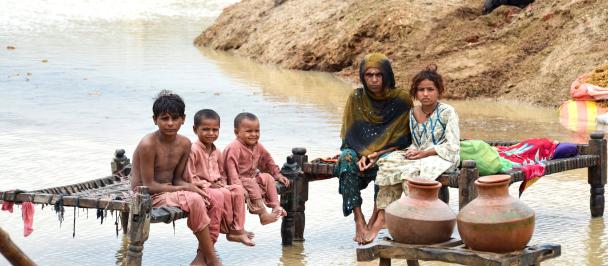08 June, 2020, Karachi— The United Nations Development Programme (UNDP) concluded the Sindh segment of the “Master the Disaster” Digital Hackathon for Disaster Risk Reduction today– the second in a series of online hackathons held in partnership with Concepts Unlimited. The first was held in Khyber Pakhtunkhwa.The hackathon aimed to generate innovative ideas related to preparedness and response for climate change induced disasters and pandemic crises such as COVID-19. The two-day hackathon gathered more than 70 participants including youth, academia, representatives from both the private and public sectors, development sector, and the provincial government. Participants joined in from across Sindh, including Karachi, Dadu, Tharparkar, Umerkot, Naushahro Feroze, Hyderabad and Nawabshah.They worked in teams while being guided by experts in the fields of technology, entrepreneurship, public health, and climate change. UNDP will work with the winning teams to scale up their ideas with the help of exclusive mentorship and access to partnerships with incubation centres.
The participating teams pitched their ideas to a panel of judges. Ideas ranged from innovative pest control and forecasting to incentive programmes for farmers. One winning idea is providing farmers with large nets to trap locusts and also connecting them to the poultry feed industry. The second winner, related to COVID-19, is an online platform to connect students confined at home with other student volunteers through a “buddy system”, who can also connect affected students with mental health professionals if required.

Mr. Abduvakkos Abdurahmanov, Chief Technical Advisor, Climate Change and Resilience welcomed the participants on behalf of UNDP and said, “Sindh is particularly vulnerable to a range of natural hazards, such as droughts, floods, and heatwaves. We cannot stop natural events from happening, but the current crisis has shown that we can prepare better so that vulnerable populations are better protected. During this hackathon, we will have teams working both on climate change related disasters and the Coronavirus pandemic.”
Mr. Naeem Iqbal, UNDP’s National Project Coordinator for Disaster Risk Reduction, explained the challenge statements and said, “Pakistan is highly vulnerable to a variety of natural and man-made hazards. Sindh us unfortunately the province currently most affected by COVID-19, and locusts are posing a serious threat to crops which means that health systems are being rapidly overwhelmed and the nation’s food security is under threat. I would like to encourage young people to focus on locust attacks as the latest issue that needs our attention.”
Mr. Muhammas Sohail, Programme Officer ECCU, UNDP, closed the event and said, “The diversity of knowledge and experience we witnessed over these two days has been truly encouraging and has shown us that anything is possible. This may be the end of this hackathon, but the ideas you came up with are just the beginning of something new.”
In addition to the ongoing pandemic, Pakistan’s vulnerability to climate change and related disasters is already high. The country ranks 5th on the Global Climate Risk Index of countries most affected by climate change. Reducing disaster risk and increasing the resilience of people is therefore imperative. UNDP has been working in this area in accordance with its mandate and core competencies including enhancing government capacity to reduce disaster risk at the national, provincial and district levels, and supporting community resilience building for at-risk communities.
For additional information, please contact Ayesha Babar at ayesha.babar@undp.org or +92 (51) 835 5650
### ### ###
UNDP is the leading United Nations organization fighting to end the injustice of poverty, inequality, and climate change. Working with our broad network of experts and partners in 170 countries, we help nations to build integrated, lasting solutions for people and planet.
Learn more at undp.org or follow at @UNDP

 Locations
Locations



